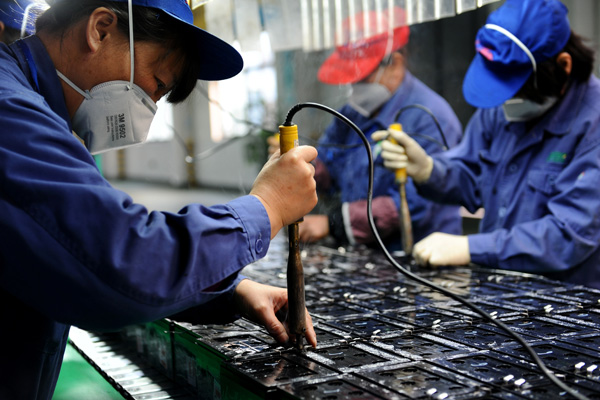 |
|
Workers assemble lithium colloid batteries for China's wind power stations at a factory in Zhejiang province. [Photo by Liang Zhen/For China Daily] |
After installing more wind and solar farms than anywhere else on the planet, China is ratcheting back the pace of growth in an industry that's helped lower the costs of green energy worldwide.
Installations of new wind and solar farms in China are expected to drop 11 percent in 2017 from a record high this year, according to Bloomberg New Energy Finance. That would be the first decline in the history of the modern renewables business, now a little more than a decade old, for a nation that has provided about a third of the investment for the industry.
After five years of breakneck growth in the supply, China's electricity demand is stagnating along with a slowing in the nation's economic expansion. The Chinese government has started recalibrating subsidies for the business, a move that's likely to hit the industry's leading manufacturers, Xinjiang Goldwind Science& Technology Co and Trina Solar Ltd.
"China shapes the whole world market," Paolo Frankl, head of the International Energy Agency's renewable energy division, said in an interview.
The move is crucial for renewables because China has been the single largest developer of the technology for eight years. Its demand for panels and turbines has pushed manufacturers to build factories throughout Asia, and the scale of its projects helped bring down the cost of electricity from low-polluting sources everywhere.
While global clean energy capacity is expected to swell 17 percent in 2017, it's still the slowest in at least a decade, according to BNEF, a researcher based in London. China's wind and solar capacity will grow 41.8 gigawatts next year, down from a record 46.9 gigawatts in 2016, BNEF estimates. A gigawatt is about as much as a nuclear reactor produces.
The hitherto high demand in China "gave a false sense of security to manufacturers to ramp up new capacity", said Charles Yonts, an analyst at CLSA Asia-Pacific Markets in Hong Kong. "Now they need to slog it out."
The slowdown could be short-lived. China has a history of working to prop up its manufacturers, and if makers of turbines and photovoltaic panels stumble, authorities may unleash new incentives. China's current plans for investing in clean power suggest that installations will rise again by 7 percent in 2018, BNEF estimates.
"In the long run, there is no question where China is headed," said Jules Kortenhorst, chief executive officer of the Rocky Mountain Institute, an energy consultant based in Boulder, Colorado. "China is committed to a low-carbon future."
Even so, the falloff expected for next year is notable because the industry has come to rely on China since it started its rapid expansion early in the last decade. Renewables manufacturers and developers are not accustomed to slow growth and now are facing tougher times, as highlighted by the bankruptcy of SunEdison Inc in April.
China's easing stems from a shift in government green policies. In December, Chinese officials announced they would gradually start curtailing rates paid to wind and solar development starting in the middle of this year. The lower prices for clean electricity reflect declining construction costs and will be cut again in 2018. The move triggered a flurry of building in the first half by companies pushing to break ground before the lower rates kicked in.
"Policy is destiny," said Michael Liebreich, founder of New Energy Finance, said in an interview. "Markets ignite when the policy is alive."
Based largely in China, the solar manufacturing industry, has been opening new factories in Asia and elsewhere, boosting capacity by 18 percent this year.
Bloomberg
